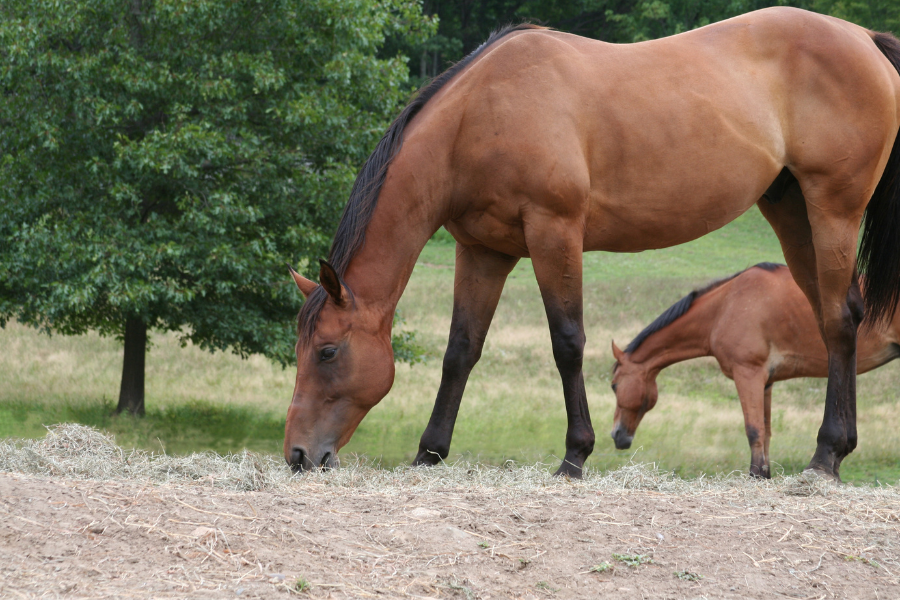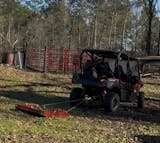A common guideline is 1–2 acres per horse, but the real answer depends on pasture quality, your horse’s needs, your management plan, and local zoning rules. Horses need space to graze, move, and socialize, but land management (like rotation, fencing, and manure cleanup) matters just as much as acreage.
Key Takeaways
-
A typical starting guideline is 1–2 acres per horse, but it depends on many factors
-
Pasture quality impacts how much grazing land your horse actually needs
-
Horses need space to move for physical and mental health, not just to eat
-
Herd dynamics and separation options matter if you keep multiple horses
-
Good land management (rotation, fencing, water, manure cleanup) is essential
Hey there, my fellow horse lovers and owners! Some of you board, and some of you keep your horses on your very own property. If you’re like me, you board and dream of keeping your horses at your home, so you can see them whenever you want. While it’s an actual dream of mine to make an apple pie in the kitchen with my horse (we all have goals - please don’t judge mine), we don’t have the space quite yet! This begs the question: how much land do you need for a horse?
A good friend of mine recently took on her local zoning board in an attempt to get them to consider zoning her home for livestock, and I have to say, until then it never occurred to me how much actually goes into keeping your horse, or horses, at home.
Figuring out the perfect amount of acreage for your hooved friend isn't just about making sure they have room to roam; it's about giving them a happy, healthy life.
So today, we’re discussing everything you need to know about land requirements for horses, including how much grazing land is needed for each horse. I know it sounds boring, but I swear I’m going to do my best to make it fun!
Okay - maybe not fun. But you’ll definitely learn a few things! Let’s go!
Understanding the Basics of Land Requirements for Horses
First things first, the golden rule often mentioned is that horses require at least one to two acres of open land per horse. This guideline is a great starting point, but it's a bit like saying "one size fits all" when we all know that's rarely the case.
Various factors can make a difference in this number:
- Quality of the pasture to the horse's size
- Activity level
- Horses personality
If there’s anything we can always rely on when it comes to horses - it’s that nothing is ever straightforward - but a great place to start is one to two acres. If I had to choose one - I’d go with two. Now let’s build on that.
Equine Grazing Needs: The Green Buffet

Horses are natural grazers. In the wild, they roam and munch on grass most of the day. This continuous movement and grazing is not only nutrition - but essential for their physical and mental health. A horse on good pasture can get most of its nutrition just from the land. However, not all lands are created equal. If your pasture is more "eh" than "yum," you might need more acreage or supplement with hay and feed.
Also, some horses have grass sensitivity - which is super important to consider.
Signs of a “Grass Affected Horse” include:
- Head-shaking
- EMS
- Laminitis
- Behavioral problems
Therefore, the amount of grazing land (and the type / quality of grazing) will depend on the individual horse’s requirements.
Exercise and Space: Room to Romp

Beyond eating, horses need space to move. Exercise is crucial for their health, helping prevent issues like obesity and boredom (yes, horses get bored, too!).
A horse that can trot, canter, and gallop freely is a happy horse. But how much space is enough?
While one to two acres might suffice for grazing, if your horse's only exercise is within its pasture, you'll want to aim for the higher end of that range or more to ensure there's plenty of room to stretch those long legs.
Movement is essential for the mental health of your horse - and it’s good for you too! Even those of you with fancy show horses - let them out and get out there with them. I want to see you all romp!
Companionship: Social Butterflies
Horses are herd animals, which means they thrive in the company of other horses. If you're planning on having more than one horse, you'll need to adjust your land calculations accordingly.
Not only do you need to think about grazing and exercise space, but also about how they'll interact. Adequate space can help minimize conflicts and ensure a harmonious herd dynamic.
You’ll also want to think about what could happen if your horses don’t get along. Do you have the space to separate them?
So much goes into it!
Local Regulations and Environmental Considerations
Before you start measuring and buying, take a gander at local zoning laws and environmental regulations. My aforementioned good friend had big dreams of bringing her mare home and adding some friends to the herd.
She lives out in the country, has around 14 acres, and she was disheartened to learn that she’s not zoned for livestock - so she’s out fighting the good fight and a whole lot of red tape.
Most areas have specific requirements about how much land you need per horse, and these rules are in place to ensure that the land can support the animals without undue environmental impact.
Do your research!
The Nitty-Gritty of Land Management
Owning enough land is one thing, but managing it properly is another ball game. Effective land management involves rotating pastures to prevent overgrazing, maintaining fences, and ensuring access to clean water. Keeping your paddocks clean by regularly removing the horse manure is also really important to managing the land sustainably and keeping your horses healthy.
It's not just about having the space; it's about making that space livable and sustainable for your horses.
When Less Land Means More Creativity

What if you're short on space? Don't worry; there are ways to make a smaller acreage work harder for you and your horse. Strategic grazing management, such as using a paddock paradise system (if possible), can encourage movement and satisfy your horse's need to roam, even on less land.
Supplemental feeding will likely be necessary, but with careful planning, even horse owners with less than the ideal amount of land can create a happy, healthy environment for their horses.
If you don’t have access to enough grass, input from your vet and a reputable equine nutritionist are a must!
A Happy Horse is a Healthy Horse (Generally)
While the rule of thumb is one to two acres per horse, the real answer to "How much land do you need for a horse?" is, "It depends." It depends on the quality of your pasture, how many horses you have, their lifestyle, and your commitment to managing the land effectively.
The key is to assess your situation, plan accordingly, and always prioritize the well-being of your equine friends.
Horses bring so much joy into our lives; they deserve the best we can provide. Whether you're just starting on your horse ownership journey or looking to optimize your current setup, understanding the land requirements is a crucial step towards ensuring your horses lead a content, healthy life!
If you are looking to keep your horses at home, you will need to keep those paddocks clean. Of course, you don’t want to sacrifice time with your horse in order to do so! In that case, it’s worth investing in Paddock Blade, the premium, American-made poop scooper for horses. Paddock Blade can save you 70% of your paddock cleaning time, and 90% of your paddock cleaning effort, allowing you to spend less time poo picking and more time with your horse. After all, isn’t that the main reason we all want to keep our horses at home?
Shop the Paddock Blade poop scooper for horses today.
Frequently Asked Questions
1. Is 1 acre enough for one horse?
It can be a starting point, but it depends on pasture quality, how much hay you feed, and how well the land is managed.
2. Why do some people recommend 2 acres per horse?
More acreage gives better flexibility for grazing, movement, and pasture management, especially if turnout is the horse’s main exercise.
3. Do horses need pasture to be healthy?
Not always, but they do need space to move, access to forage, and a safe turnout setup that supports their physical and mental health.
4. What if my horses don’t get along?
It helps to have enough space or fencing options to separate horses when needed for safety and herd management.
5. Should I check zoning laws before bringing a horse home?
Yes. Some properties aren’t zoned for livestock, even if they have plenty of land.
TL;DR
A common guideline is 1–2 acres per horse, but the right amount depends on pasture quality, horse needs, turnout and exercise space, herd dynamics, and local zoning laws. Managing the land well—through rotation, fencing, water access, and manure cleanup—matters just as much as the acreage number.




